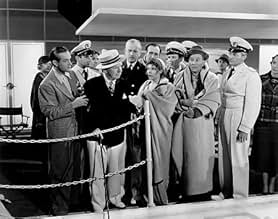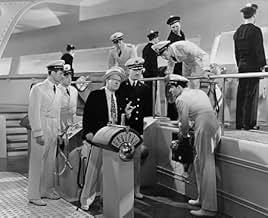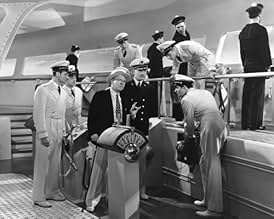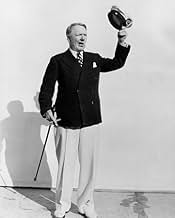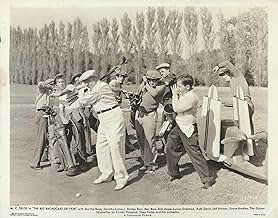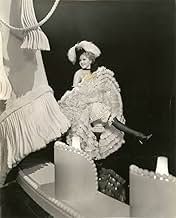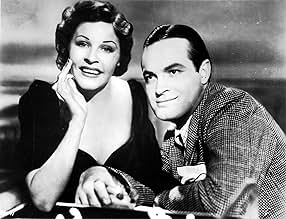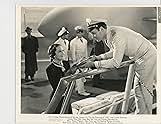IMDb रेटिंग
6.1/10
1.1 हज़ार
आपकी रेटिंग
अपनी भाषा में प्लॉट जोड़ेंThe Bellows family causes comic confusion on an ocean liner, with time out for radio-style musical acts.The Bellows family causes comic confusion on an ocean liner, with time out for radio-style musical acts.The Bellows family causes comic confusion on an ocean liner, with time out for radio-style musical acts.
- 1 ऑस्कर जीते
- कुल 5 जीत
Leif Erickson
- Bob Hayes
- (as Leif Erikson)
Virginia Vale
- Joan Fielding
- (as Dorothy Howe)
फ़ीचर्ड समीक्षाएं
Lots of mainly young and beautiful stars of the thirties appear in this movie. Dorothy Lamour and Shirley Ross are knockouts with the zany Martha Raye as a comic foil. This is a great movie for black and white buffs.
Some classic scenes in this movie:
W. C. Fields in his best golf playing scenes ever.
Martha Raye hugging and puffing with her big mouth against a sail to keep a life raft sailing toward a big ocean liner.
Kirsten Flagstad from the Metropolitan opera delivering a Wagner aria.
But the piece de resistance is Shirley and Bob singing what would later become Bob Hope's Theme song, "Thanks for the Memory."
Although not listed in the cast, I saw Lucille Ball, probably with the most lines of any of her thirties' movies.
Some classic scenes in this movie:
W. C. Fields in his best golf playing scenes ever.
Martha Raye hugging and puffing with her big mouth against a sail to keep a life raft sailing toward a big ocean liner.
Kirsten Flagstad from the Metropolitan opera delivering a Wagner aria.
But the piece de resistance is Shirley and Bob singing what would later become Bob Hope's Theme song, "Thanks for the Memory."
Although not listed in the cast, I saw Lucille Ball, probably with the most lines of any of her thirties' movies.
THE BIG BROADCAST OF 1938 (Paramount, 1938), directed by Mitchell Leisen, is another one of those "plotless" musicals produced by Paramount in the 1930s, this being the most memorable mainly because it puts two comic legends on screen for the first and only time: W.C. Fields (in his final film for the studio) and Bob Hope as Buzz Fielding (in his feature film debut). Out with the old, in with the new. Yet Fields and Hope share no scenes together, with Hope getting more screen time than Fields (in a dual role playing twin brothers).
The radio broadcast, hosted by Hope himself, is set on an ocean liner during a transatlantic race with another. Memorable moments include W.C. Fields golf game routine, and Shirley Ross as one of Hope's ex-wives sharing her "Thanks for the Memory" with him. "Memory" would become Hope's theme song for the duration of his career, and the Academy Award winning tune of 1938. In spite of her name placed second in the cast, Martha Raye, as Fields' accident prone daughter, arrives late into the story, making the best of her "Oh, boys!" and hi-jinx antics, as well as her song number, "Mama, Oh, Mama." On the lighter side, Dorothy Lamour (who twice sings "You Took the Words Right Out of My Heart") is somewhat wasted with her limited footage as Hope's fiancé who may or may not become Mrs. Fielding No. 4.
Aside from Lynne Overman, Ben Blue, Grace Bradley and Leif Erickson participating in the storyline, the shipboard entertainment consists of special guest appearances from Shep Fields and his Rippling Rhythm Orchestra (singing "This Little Ripple Has Rhythm"); Tito Guizar (singing "Zumi-Zumi" and "Don't Tell a Secret to a Rose") and Kirsten Flagstad (performing Richard Wagner's "Brunnilde's Battle Cry"). With the exception of "Thanks for the Memory," the score by Leo Robin and Ralph Rainger is forgettable. The big broadcast finale, "The Waltz Lives On" (sung by Hope and Ross) is passable, with Raye stepping into this number briefly with her hot jive "Truckin'". It's also interesting during that same number to see Hope dancing with Ross.
The final "Big Broadcast" musical consists of so much talent with little screen time, possibly victims of severe film editing. The theatrical trailer does include of Kirsten Flagstad performing in another opera segment not included in the final print. Although THE BIG BROADCAST OF 1938 can be a disappointment with too little Fields and too many song numbers unrelated to the plot, it somehow gets by.
The musical-comedy did have frequent revivals on the American Movie Classics cable channel from 1995 to 1998. The license to air this was later picked up by Turner Classic Movies where it premiered June 18, 2001, as part of its "Star of the Month" tribute, W.C. Fields. Prior to the start of the movie, host Robert Osborne talked a bit about the this Big Broadcast installment, and the annual musicals that preceded it, starting with the one that launched Bing Crosby in 1932, and the second in the series THE BIG BROADCAST OF 1936. Yet, there was no mention at all about the third, THE BIG BROADCAST OF 1937, as if it never existed, jumping immediately to 1938. While the three "Big Broadcast" musicals are close to being forgotten today, the 1938 edition happens to be the only one of the four available on video cassette and later on DVD, as part of the double feature package with 1938's COLLEGE SWING, also featuring Martha Raye and the legendary Bob Hope. Thanks for the Memories.(***)
The radio broadcast, hosted by Hope himself, is set on an ocean liner during a transatlantic race with another. Memorable moments include W.C. Fields golf game routine, and Shirley Ross as one of Hope's ex-wives sharing her "Thanks for the Memory" with him. "Memory" would become Hope's theme song for the duration of his career, and the Academy Award winning tune of 1938. In spite of her name placed second in the cast, Martha Raye, as Fields' accident prone daughter, arrives late into the story, making the best of her "Oh, boys!" and hi-jinx antics, as well as her song number, "Mama, Oh, Mama." On the lighter side, Dorothy Lamour (who twice sings "You Took the Words Right Out of My Heart") is somewhat wasted with her limited footage as Hope's fiancé who may or may not become Mrs. Fielding No. 4.
Aside from Lynne Overman, Ben Blue, Grace Bradley and Leif Erickson participating in the storyline, the shipboard entertainment consists of special guest appearances from Shep Fields and his Rippling Rhythm Orchestra (singing "This Little Ripple Has Rhythm"); Tito Guizar (singing "Zumi-Zumi" and "Don't Tell a Secret to a Rose") and Kirsten Flagstad (performing Richard Wagner's "Brunnilde's Battle Cry"). With the exception of "Thanks for the Memory," the score by Leo Robin and Ralph Rainger is forgettable. The big broadcast finale, "The Waltz Lives On" (sung by Hope and Ross) is passable, with Raye stepping into this number briefly with her hot jive "Truckin'". It's also interesting during that same number to see Hope dancing with Ross.
The final "Big Broadcast" musical consists of so much talent with little screen time, possibly victims of severe film editing. The theatrical trailer does include of Kirsten Flagstad performing in another opera segment not included in the final print. Although THE BIG BROADCAST OF 1938 can be a disappointment with too little Fields and too many song numbers unrelated to the plot, it somehow gets by.
The musical-comedy did have frequent revivals on the American Movie Classics cable channel from 1995 to 1998. The license to air this was later picked up by Turner Classic Movies where it premiered June 18, 2001, as part of its "Star of the Month" tribute, W.C. Fields. Prior to the start of the movie, host Robert Osborne talked a bit about the this Big Broadcast installment, and the annual musicals that preceded it, starting with the one that launched Bing Crosby in 1932, and the second in the series THE BIG BROADCAST OF 1936. Yet, there was no mention at all about the third, THE BIG BROADCAST OF 1937, as if it never existed, jumping immediately to 1938. While the three "Big Broadcast" musicals are close to being forgotten today, the 1938 edition happens to be the only one of the four available on video cassette and later on DVD, as part of the double feature package with 1938's COLLEGE SWING, also featuring Martha Raye and the legendary Bob Hope. Thanks for the Memories.(***)
I really don't understand what some people expect when they watch an old movie like this. This one in my estimation, is light hearted and entertaining. It is a showcase for some of our greatest stars as they were just starting out. Is it their best effort? Probably not. But it is fun to watch if you don't take it too seriously. I'm awfully glad we have it around to watch. Being a fan of almost every star in it, I consider it a treasure chest of many favorites talent. W.C. Fields is wonderful through out the film. Some of his skits are hilarious! Bob Hope is so good in his role that you have to really feel sorry for his character. Of course the song "Thanks For The Memories" is forever linked to him with this film. Martha Ray is hilarious in another one of her zany roles. All in all, a very good and entertaining film to be watched over and over. A real, or reel part of history.
7tavm
W.C. Fields and Bob Hope are probably the reasons anyone would still watch The Big Broadcast of 1938
This was my third time in watching this movie when I popped the DVD in just now. It's notable as W.C. Fields' last for Paramount, and Bob Hope's first feature after years of doing shorts. It also marked the first time Hope performed what became his theme song-"Thanks for the Memory"-which, as performed here, was originally a bittersweet ditty of a love that had its ups and downs with Shirley Ross providing a nice share of wit in duetting with Hope in singing it. Fields is funny whether playing golf, pool, or trying to run the ship though I admit I rewinded some of his scenes to try to understand what he's saying! Two future Hope co-stars, Dorothy Lamour and Martha Raye, provide some charms along the way with Ms. Lamour singing a nice romantic ballad and Ms. Raye doing some great comic banter and slapstick. There's also some amusements from Ben Blue and a forgotten lady named Patricia Wilder as a Southern belle doing deadpan shtick. Oh, and an animated sequence produced by Leon Schlesinger though since he was just a money man, it could possibly have been helmed by whoever was the "supervisor" under him at the time like Fred "Tex" Avery, Robert Clampett, or Frank Tashlin. No great shakes but The Big Broadcast of 1938 is worth a look for historical reasons and if you find the people I mentioned entertaining.
The trans-Atlantic race is on between the two great ocean liners, the Colossal and the Gigantic. On board the Gigantic (or is it the Colossal? Not even all of the passengers are sure) is an assortment of characters who present us with a sort of variety show over the course of the voyage:
The plot is an uneven mishmash, but some good songs stand out. Lamour sings "You Took the Words Right Out of My Heart," a lovely ballad. Raye does one called, "Mama, That Moon Is Here Again," which builds into a wild acrobatic dance in which sailors toss Martha all around the deck. The performance by Hope and Ross of "Thanks for the Memory" is truly excellent—it's a bittersweet song that we all know and yet it actually means something in its context of two old lovers hashing over regrets and falling back in love. It's a wonderfully touching and low key performance.
In between these highlights is a lot of nonsense, some of it amusing. The plot doesn't exactly buzz along—it stops and starts too much before ultimately drawing to a rather hasty resolution at the end of the voyage. It is kind of like of a big broadcast, a radio all star variety program, I suppose. Taken as a whole, it's really not that great a picture—but it's certainly worth seeing for the sake of its numerous highlights.
- W.C. Fields, ship's owner. He stops on the way to the pier for a game of golf ("Stand clear, keep your eye on the ball," he tells his large team of caddies) and so has to catch up with the ship by flying in on his mini-helicopter. He's nuts. He has a daughter...
- Martha Raye: According to pop Fields, "She's an unfortunate girl .Seven years ago, she crashed an aeroplane in a mirror factory. Broke 9,831 mirrors."
- Bob Hope: A radio announcer broadcasting updates on the race, he is accompanied on the journey by his three ex-wives, who intend to prevent prospective wife number four from cutting into their alimony checks ("She can't chisel me down to any 25%....").
- Dorothy Lamour, who has second thoughts about becoming that fourth wife when she meets
- Leif Erickson, handsome and brilliant young engineer who has designed the special propulsion system for the ship.
- Shirley Ross, one of the ex-wives. She and Hope get to chatting and can't quite remember why they ever divorced in the first place.
The plot is an uneven mishmash, but some good songs stand out. Lamour sings "You Took the Words Right Out of My Heart," a lovely ballad. Raye does one called, "Mama, That Moon Is Here Again," which builds into a wild acrobatic dance in which sailors toss Martha all around the deck. The performance by Hope and Ross of "Thanks for the Memory" is truly excellent—it's a bittersweet song that we all know and yet it actually means something in its context of two old lovers hashing over regrets and falling back in love. It's a wonderfully touching and low key performance.
In between these highlights is a lot of nonsense, some of it amusing. The plot doesn't exactly buzz along—it stops and starts too much before ultimately drawing to a rather hasty resolution at the end of the voyage. It is kind of like of a big broadcast, a radio all star variety program, I suppose. Taken as a whole, it's really not that great a picture—but it's certainly worth seeing for the sake of its numerous highlights.
क्या आपको पता है
- गूफ़Near the end of the movie the helmsman said that the S.S. Gigantic was diesel powered. That would mean that the liner's proper name would be MV (Motor Vessel) Gigantic as opposed to SS (Stream Ship) Gigantic.
- भाव
First reporter: Say, do you know anything about electricity?
S.B. Bellows: My father occupied the chair of applied electricity at State Prison.
- कनेक्शनFeatured in Hollywood and the Stars: The Fabulous Musicals (1963)
- साउंडट्रैकThis Little Ripple Had Rhythm
(uncredited)
Music by Ralph Rainger
Performed by Shep Fields and His Rippling Rhythm Orchestra
टॉप पसंद
रेटिंग देने के लिए साइन-इन करें और वैयक्तिकृत सुझावों के लिए वॉचलिस्ट करें
- How long is The Big Broadcast of 1938?Alexa द्वारा संचालित
विवरण
- रिलीज़ की तारीख़
- कंट्री ऑफ़ ओरिजिन
- भाषा
- इस रूप में भी जाना जाता है
- Radioparaden 1938
- फ़िल्माने की जगहें
- Eastern Service Studios, Astoria, क्वींस, न्यूयॉर्क शहर, न्यूयॉर्क, संयुक्त राज्य अमेरिका(sequence: Kirsten Flagstad aria)
- उत्पादन कंपनी
- IMDbPro पर और कंपनी क्रेडिट देखें
- चलने की अवधि1 घंटा 31 मिनट
- रंग
- पक्ष अनुपात
- 1.37 : 1
इस पेज में योगदान दें
किसी बदलाव का सुझाव दें या अनुपलब्ध कॉन्टेंट जोड़ें

